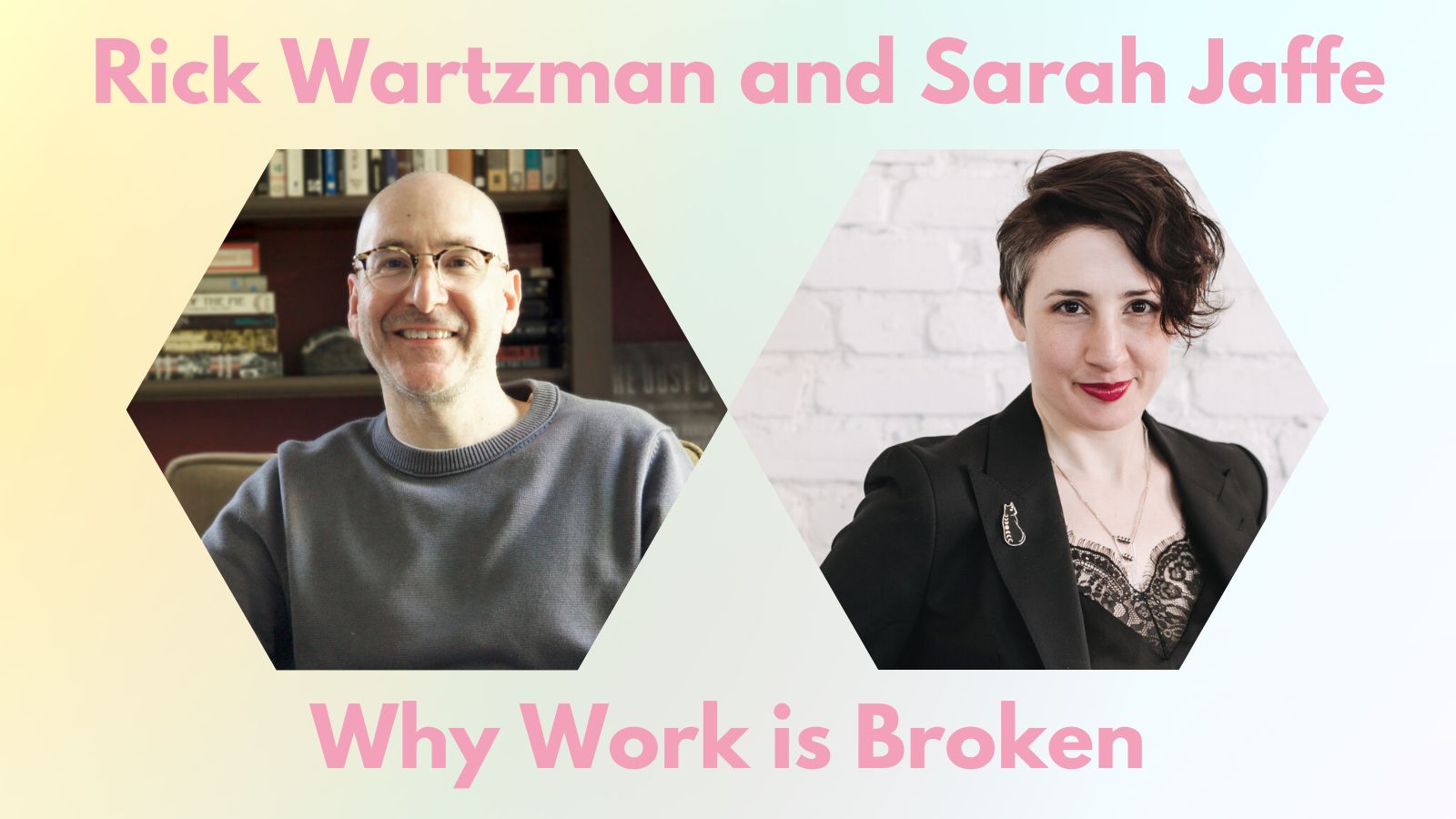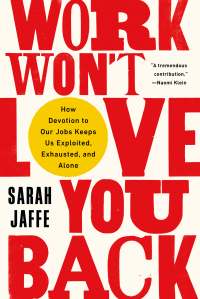On This Day, Remember: Work Is Broken

To help resurrect the true meaning of work, we invited two authors to give you a friendly reminder: Work Won’t Love You Back.
That’s the latest book from independent labor journalist Sarah Jaffe. In it, Jaffe examines how workers’ devotion to their jobs keeps them alone, exhausted, and exploited.
Speaking of worker exploitation, Walmart is America’s biggest private employer, and is often under scrutiny for its labor practices. Rick Wartzman is Head of the KH Moon Center for a Functioning Society at the Drucker Institute and author of the upcoming book Still Broke: Walmart’s Remarkable Transformation and the Limits of Socially Conscious Capitalism.
Jaffe and Wartzman discuss the history of work, and why we’ve been duped into loving our jobs
[This interview has been edited for clarity and length].
Moderator: Sarah, can you start off by giving us some context about work and how our idea of it has changed over time?
Sarah Jaffe: The history of capitalist work has a few stages in it. One of them starts when people are kicked off of common land and required to do wage labor for a living. Essentially, work sucked, and everybody knew it.
Over a few hundred years of struggle, you get the Fordist compromise, where people will go to work in industrial jobs that probably still suck, but you’re going to get paid decently. You’re going to have a 40 hour workweek, and if you work more than 40 hours, you’ll get paid overtime. You can have an alright life, and you can maybe send your kids to college so that they don’t have to work in the damn factory at all. Come about 1973, this deal is not working very well. Because of inflation and the oil crisis, which are obviously pretty relevant again now, capital went looking for other solutions. One was essentially to crush the factories in the countries that had high union density and ship them to countries that didn’t have high union density. And what we’re left with in Britain, in the U.S., in Western Europe are the jobs that you can’t ship to Bangladesh, the ones done by people in your neighborhood.
Moderator: Rick, those are the jobs that Walmart offers, the ones that can’t be shipped overseas. Can you give us a brief history of the company and what it’s like to work there?
Rick Wartzman: I’ll start off by saying that it’s a really mixed bag when it comes to working at Walmart. First off, it’s a company of 1.7 million people, so it’s a little like popping into Metropolitan Baltimore and saying, “Are you happy here?” Well, who are you talking to? Where exactly do they live? What’s their story? With that in mind, Walmart was founded in 1962, and part of Sam Walton’s formula was extremely low wages. When he started the first handful of Walmart stores, he actually organized them in a way that allowed him to pay a sub minimum wage, which he got away with for a few reasons. First, in many cases this was supplemental income for people, so they were sort of willing to go along with it. For women in particular, there were not a lot of alternatives. They lacked choice, and in many cases, Walmart workers still lack choice. They’re not vying between a Walmart job and going to be a data scientist at Google. Second, Sam Walton was incredibly charismatic. He would fly from store to store, and he’d wear a name tag that said “Sam” on it as if nobody knew who he was. And people loved him. Even frontline workers who were being paid miserable wages and sometimes worked in terrible conditions still loved Sam Walton.
SJ: Yeah, Walmart is endlessly fascinating in that way. If you think about Amazon, it’s just this relentless drive to dominate the economy, and it really doesn’t really give a crap if they’re seen as an utterly brutal, miserable workplace. Whereas Walmart is this whole psycho-social thing that I’ve seen at a lot of other companies who had the same sort of family thing. I’m thinking about Toys “R” Us and Ann Marie, one of the characters in my book. The company was really good to her up until the moment when they weren’t — right up until they were bought by Bain Capital and stripped for parts. And that’s something that I heard from Walmart employees all the time. After the Walmart shareholders meeting one year, one of them said to me, “Yeah, they are a family business, but we aren’t in the family.”
RW: Absolutely. That idea of a family became harder to maintain after Sam Walton’s death in 1992. Then the company had this moment in 2005 that has been so mythologized, internally and externally, but there’s also some truth to it. Hurricane Katrina comes, and Walmart uses their logistics might and their sheer size to get all kinds of goods and services to people who have been affected. They do a great job. They do a way better job than FEMA, and they get a lot of kudos for it. That starts a 10-year journey of trying to do more, especially around the environment. On the simplest level, it was “Hey, if we have smaller packaging, it’s good for the environment. We also save money. If we can make our truck fleet more efficient, it’s good for the environment. We also save money.” So that really spoke Walmart’s language. I talked to a lot of the mainstream environmental groups and some of the more progressive groups, and there is a general consensus that Walmart has been an environmental leader. But like I said, it’s a mixed bag when it comes to Walmart. During that same period, there’s really no wage increase. It wasn’t until after Doug McMillon took over in 2014 that they raised starting wages for the first time.
When Doug came in, the average starting pay was $7.65 an hour, barely over the federal minimum wage of $7.25. Now, after all of this internal and external pressure, they’re up to $12 an hour. That sounds like a big improvement, but the average Walmart worker still makes less than $29,000 a year. We know there are tens of thousands of Walmart workers on food stamps and Medicaid.
SJ: I heard a similar story from a Planned Parenthood employee I followed. I am not saying that Walmart workers do not work really hard because they do, but they aren’t usually walking through a line of people screaming at them and calling them baby killers every morning to do it. And they are not dealing with death threats, and the level of crap Planned Parenthood workers were putting up with for $12 or $13 an hour is insane. And a lot of the workers right now are seeing the amount of outrage and anger and donations that are pouring into the coffers of Planned Parenthood, and they’re saying, “More than ever, we need to actually have a say in what’s happening to us because we are the ones who are doing this really, really difficult and constantly threatened work.”
RW: I’m shocked that those workers are making that little. I think it points to something that I write about in the book, which is the long history of the working poor being invisible. Somewhere between 25 to 40% of the labor force — you’re talking 40 to 65 million people — struggle to make ends meet.
SJ: Yeah, there are all these levels of mounting pressure on people. Because more and more jobs require you to have some sort of a degree, that means debt. And if you’re trying to get into these supposedly lovable jobs, like the one I have, you probably had to do an unpaid internship, and you’re probably living in one of the most expensive places in the world because that’s where the jobs are.
Moderator: So what are the potential solutions here? Raising wages is obviously one, and unionizing, too, right?
SJ: To organize, you have to find somebody who cares enough about the thing to change it rather than quit. This is what’s really interesting about Chris Small, the leader of the Amazon labor union. Chris Smalls gets fired, and most people who get fired go and get another job, and we sulk and we hate our boss. Chris Smalls spends the next year of his life helping organize the place that fired him.
RW: It was the same dynamic at Walmart. The consultant who helped organize OUR Walmart, which is in the book, said, “We can’t have people who hate Walmart in the group. We’re actually looking for people who, at least like WalMart and want to be here.” So again, it’s a complicated situation.
Moderator: Any closing thoughts on the state of work right now?
RW: Sarah, are you like, “There is really something going on that has enough energy behind it that there could be real, meaningful change?” Or are you like, “Yeah, they’ve organized 300 Starbucks, but there are 9,000 Starbucks store, and unless there’s big structural change — sectoral bargaining, the Pro Act, etc., — this is just going to be a blip?SJ: I think it’s both / and. Somebody used the term “skyrocketing” to talk about unions recently, and I wish it was. The reality of American labor law is that it requires you to organize Starbucks store by Starbucks store, which means that you’re organizing 20 or 30 workers at a time, and those workers are getting fired. None of them have a contract yet. There is a big, long fight ahead of the people who want to unionize, and that often doesn’t make sexy headlines, right? But there is something going on here. There is a lot of anger because you can only cross people for so long before they start setting things on fire and cutting the heads off kings.
You’re told that if you “do what you love, you’ll never work a day in your life.”
In Work Won’t Love You Back, Sarah Jaffe, a preeminent voice on labor, inequality, and social movements, examines this “labor of love” myth—the idea that certain work is not really work, and therefore should be done out of passion instead of pay. Told through the lives and experiences of workers in various industries, Jaffe reveals how all of us have been tricked into buying into a new tyranny of work. Once freed from those binds, we can finally figure out what actually gives us joy, pleasure, and satisfaction.
